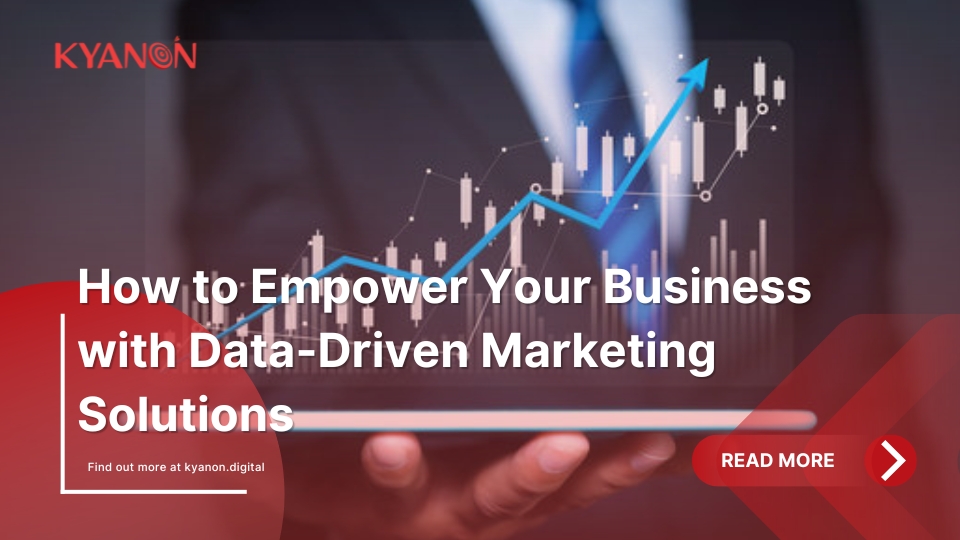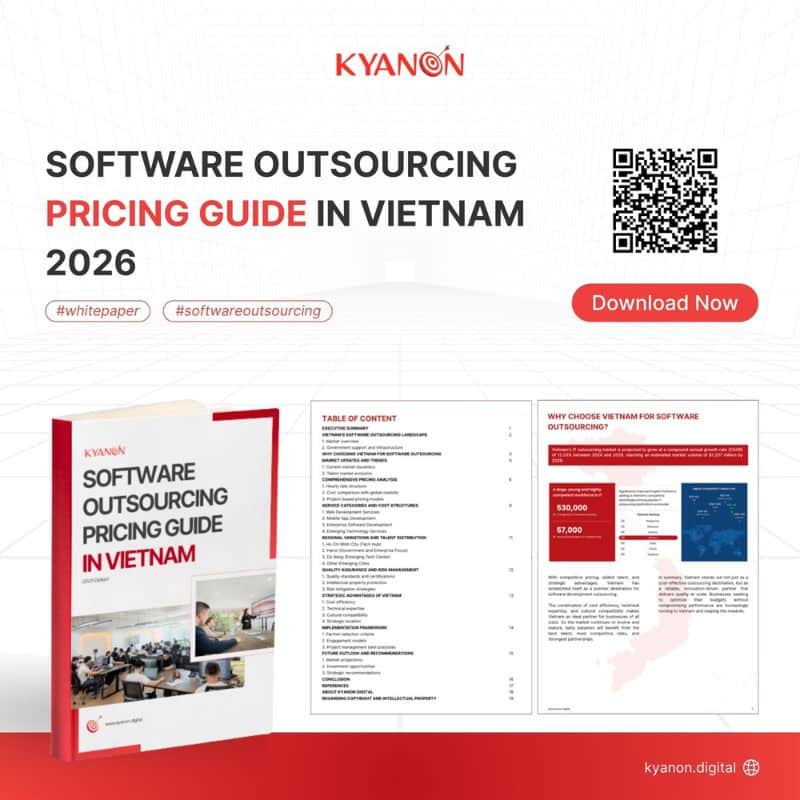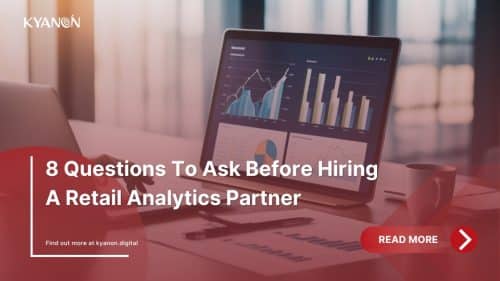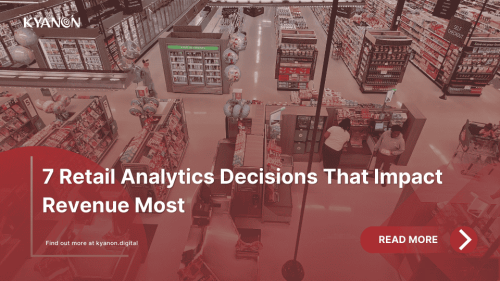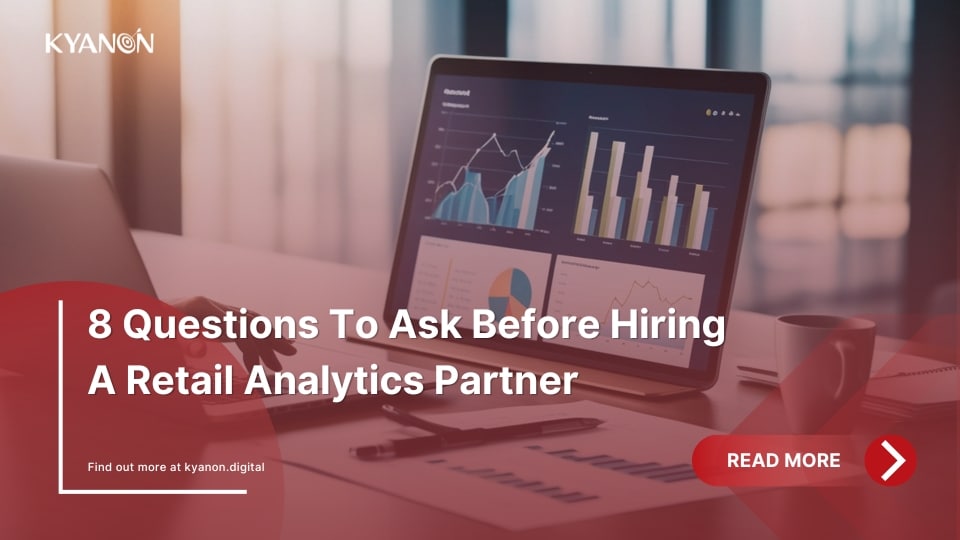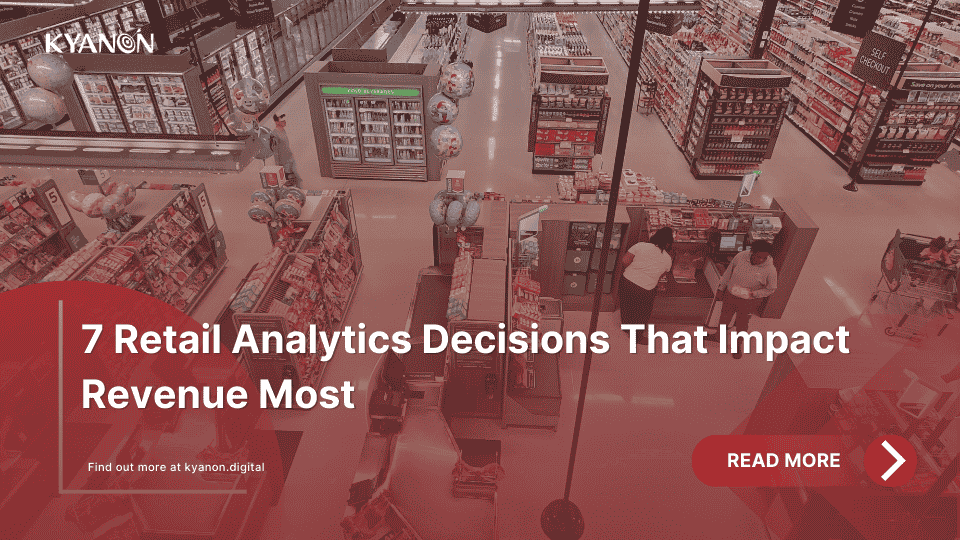Turn data into profit! Discover how data-driven marketing powers business growth, boosts ROI, and delivers smarter, targeted results for lasting success.
Data-driven marketing is changing how businesses succeed in the digital world. By using data insights, companies can create targeted campaigns and personalized customer experiences that really boost their bottom line.
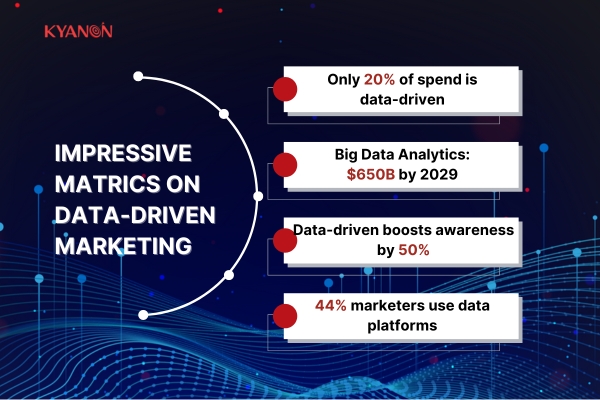
According to McKinsey & Company, 64% of marketing executives “strongly agree” that data-driven marketing is essential in today’s competitive market.
In this blog, we’ll explore why data-driven marketing matters, highlight its benefits and share simple tips for businesses to use data-driven strategies effectively. Keep reading to find out how you can use data to get ahead of your competition!
1. Understanding Data-Driven Marketing
1.1. The Technology Behind Smart Decisions
In an era where customer expectations are continuously evolving, data-driven marketing has emerged as a game-changing strategy for businesses. By harnessing the power of customer data, companies can make informed marketing decisions that resonate with their target audience.
1.2. The Role of Technology in Data-Driven Marketing
The technology behind data-driven marketing is vital to its effectiveness. Advanced analytics tools and software enable businesses to collect, process, and interpret vast amounts of data. This technology not only streamlines data management but also enhances the accuracy of insights. With real-time data analysis, marketers can swiftly adapt their strategies to meet changing customer demands, ensuring they remain relevant in a competitive market.
1.3. How Data-Driven Marketing Differs from Traditional Marketing
Traditional marketing often takes a broad approach, delivering the same message to a large audience in the hope that it resonates with some. This “one-size-fits-all” method is less efficient because it doesn’t consider individual customer preferences.
Element |
Traditional Marketing |
Data-Driven Marketing |
Strategy |
Broad, generic messages aimed at mass audiences | Targeted, personalized messages tailored to specific segments |
Audience Targeting |
A one-size-fits-all approach without specific segmentation | Utilizes customer data to segment audiences based on behavior and preferences |
Content Relevance |
Generic content that may only resonate with some | Customized content that aligns with individual customer interests and needs |
Data Utilization |
Minimal use of data; often relies on assumptions and historical data | Extensive use of real-time data and analytics to inform marketing strategies |
Campaign Adaptability |
Difficult to adjust once launched, often fixed for a specific duration | Agile campaigns that can be modified based on performance metrics and audience feedback |
Conversion Tracking |
Harder to measure effectiveness and ROI; relies on indirect metrics | Clear tracking of conversions and detailed analytics to measure success |
In contrast, data-driven marketing focuses on personalization. By using data insights, businesses can create highly targeted campaigns for specific customer segments. Instead of generic ads or emails, data-driven marketing tailors messages to each customer’s behavior, interests, and needs, resulting in more relevant and engaging content. This approach helps companies connect better with their audience and drive higher conversions. When done right, data-driven marketing turns raw information into a powerful tool for growth, delivering campaigns that speak directly to what customers want.
2. Why Your Business Needs Data-Driven Marketing Now?
In today’s competitive market, businesses need to make smarter decisions faster. Data-driven marketing gives companies a powerful edge by using customer data to craft targeted strategies that drive real results. Here’s why your business needs data-driven marketing now:
2.1. Boost Customer Engagement
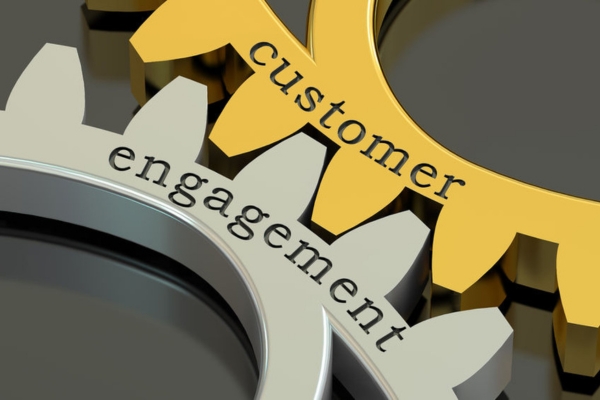
By analyzing customer behavior and preferences, businesses can create personalized messages and offers that capture attention and spark meaningful interactions. Real-time data helps businesses deliver the right content at the right time, keeping customers engaged and loyal.
2.2. Increase Conversion Rates

The more personalized your marketing, the better the chances of conversion. By leveraging data to tailor messages, ads, and product recommendations to specific customer groups, businesses see higher conversion rates. For example, companies like Amazon and Netflix use data to suggest products or shows based on past behavior, driving repeat purchases and increasing customer satisfaction.
2.3. Maximize ROI

Data-driven strategies help businesses invest their marketing budget wisely. Instead of wasting resources on broad, untargeted campaigns, companies can focus on high-value customers who are more likely to convert. This precise targeting leads to better campaign performance and higher returns on investment (ROI). For example, Starbucks uses data from its loyalty program to send personalized offers, which has significantly boosted sales and customer retention.
2.4. Real-World Success
Many leading companies have already seen great success with data-driven marketing. Coca-Cola uses data analytics to refine its ad targeting and improve customer engagement. Another example is Spotify’s “Wrapped” campaign, which personalizes users’ listening data to create a fun, shareable year-in-review, boosting user interaction and brand loyalty.
Transform your ideas into reality with our services. Get started today!
Our team will contact you within 24 hours.
3. Step-by-Step Guide: Data-Driven Marketing Solutions for Your Business
Data-driven marketing can transform how businesses connect with their customers. Here’s a step-by-step guide to help you get started, along with the best tools and tips to drive results.
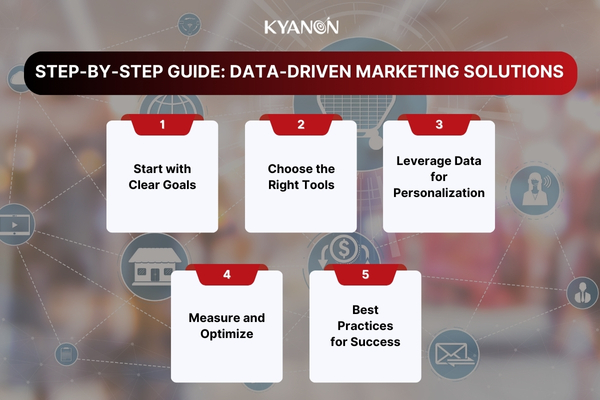
Step 1: Start with Clear Goals
Before diving into data, set specific marketing goals. Whether you want to increase website traffic, boost conversions, or improve customer retention, knowing your objectives will help guide your data-driven strategy.
Step 2: Choose the Right Tools
To implement data-driven marketing, you’ll need the right tools for data collection, analysis, and measurement. Here are some essential tools for businesses:
- Customer Relationship Management (CRM) Platforms: CRM platforms are essential tools that help businesses track customer interactions, preferences, and purchase history, leading to more personalized marketing efforts. In 2023, the CRM industry is rapidly evolving due to new technologies and a stronger focus on customer needs. As businesses strive to boost customer loyalty, systems like Open Loyalty provide flexible, customer-focused solutions that integrate loyalty programs, allowing your business to adapt and grow effectively.
- Analytics Tools: Google Analytics and similar platforms provide insights into customer behavior on your website, helping you understand traffic, engagement, and conversions.
- Email Marketing Tools: Mailchimp and similar platforms allow businesses to create personalized email campaigns based on user behavior and preferences.
- Social Media Insights: Use tools like Instagram Insights or Facebook Analytics to understand your audience’s preferences and optimize your social media campaigns.
Step 3: Leverage Data for Personalization
Once you have the data, use it to create personalized marketing campaigns. Segment your audience based on demographics, behavior, or purchase history, and craft tailored messages that resonate with each group. Personalization leads to higher engagement and better customer experiences.
Step 4: Measure and Optimize
Data-driven marketing is an ongoing process. Continuously track the performance of your campaigns using data from your tools. Key metrics like conversion rates (CVR), click-through rates (CTR), and ROI will show what’s working and what needs adjustment. Regularly analyze this data to refine your strategies and drive better results.
Step 5: Best Practices for Success
- Keep Data Clean: Ensure your data is up-to-date and accurate. Clean data leads to more effective marketing campaigns.
- Use Predictive Analytics: SAS Customer Intelligence 360—a product from Kyanon Digital in partnership with SAS—enables businesses to effectively predict customer behavior and understand their needs. This powerful tool allows you to develop personalized marketing strategies that enhance engagement and build customer loyalty.
- Test and Learn: Always test different approaches and analyze the results. A/B testing is a great way to optimize your campaigns over time.
4. Facing the Challenges of Data-Driven Marketing Head-On
Let’s dive into how you can effectively overcome the obstacles and harness the full potential of data-driven marketing for your business!
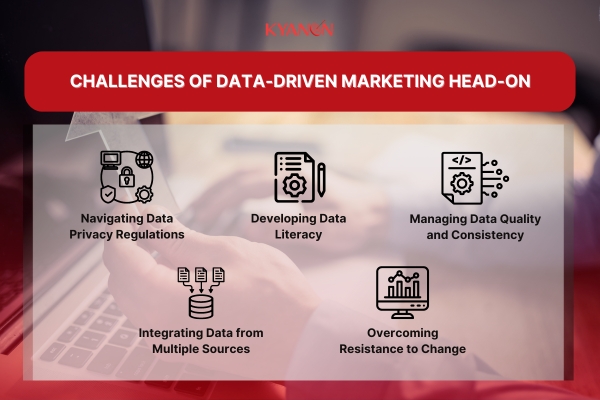
4.1. Navigating Data Privacy Regulations:
With growing concerns about data privacy, companies must comply with regulations like GDPR and CCPA.
- Solution: Stay informed and implement transparent data collection practices to build trust with customers.
4.2. Developing Data Literacy:
A lack of data literacy can hinder effective marketing strategies.
- Solution: Invest in training programs to enhance your team’s data skills, enabling smarter decisions.
4.3. Managing Data Quality and Consistency
Poor data quality can lead to misguided marketing efforts.
- Solution: Establish data governance practices and use management tools to maintain accurate, up-to-date information.
4.4. Integrating Data from Multiple Sources
Fragmented data can obstruct a clear view of customer behavior.
- Solution: Use centralized data management systems to unify customer insights for more personalized marketing.
4.5. Overcoming Resistance to Change
Employees may resist transitioning to data-driven methods.
- Solution: Cultivate a data-driven culture by sharing success stories and providing support during the change process.
5. In short
In today’s competitive market, data-driven marketing is key to business success. If you’re ready to take your marketing to the next level, explore data-driven solutions now. These strategies will unlock new opportunities and help you reach your business goals effectively.
As demand for data-driven marketing grows, businesses using data can achieve up to 30% annual growth. Kyanon Digital delivers tailored solutions to drive real results.
Ready to transform your business? Contact us today for expert consultancy and unlock your growth potential!

